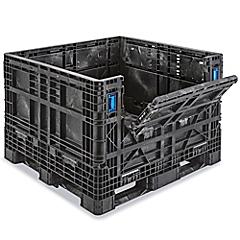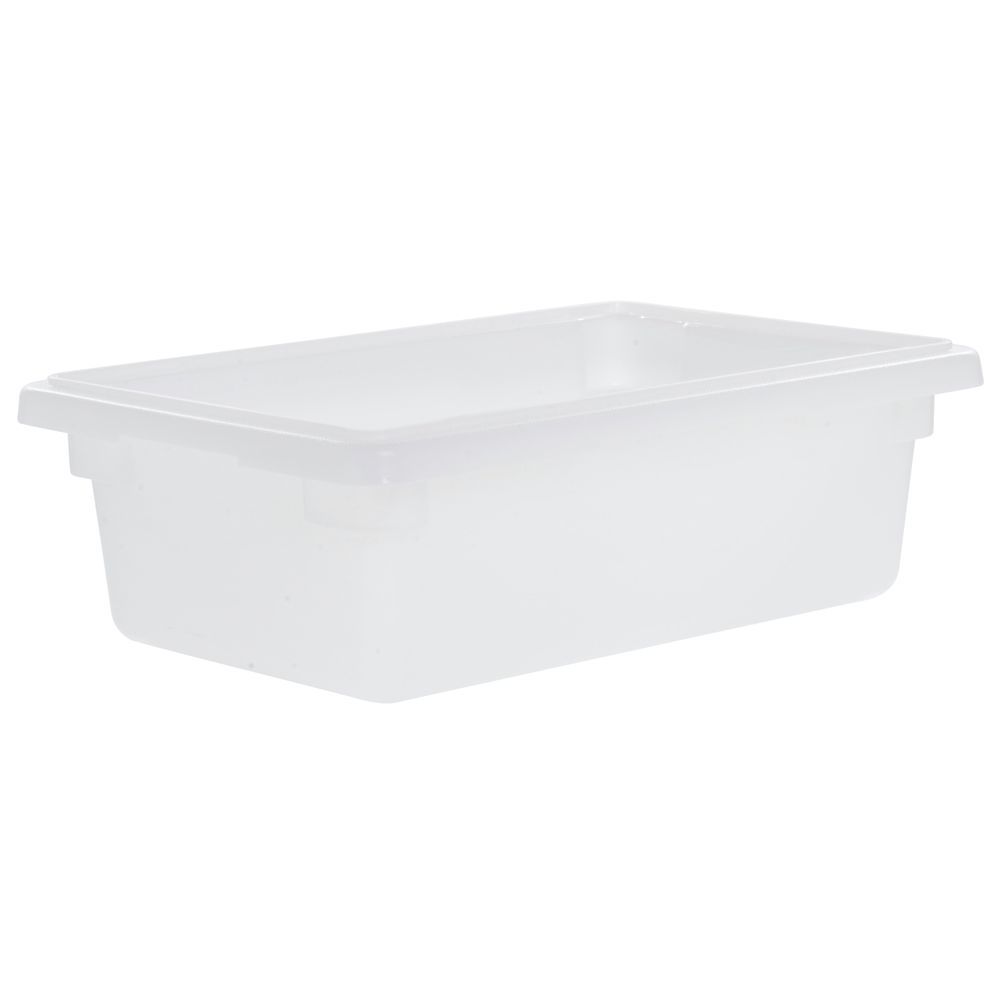Explore the top options of bulk plastic containers for sale online
Wiki Article
The Function of Bulk Plastic Containers in Effective Recycling Practices and Sustainability
Bulk plastic containers are indispensable to modern recycling efforts. Their style improves the performance of material collection and transport, contributing to sustainability goals. These containers not only maximize room however also aid in keeping track of contamination degrees. Nevertheless, their implementation is not without obstacles. Understanding the full extent of their effect exposes an intricate relationship between logistics and ecological duty that calls for further exploration.Comprehending Mass Plastic Containers
Mass plastic containers function as an essential part in numerous sectors, facilitating the storage and transport of goods. These containers are generally made from durable products such as high-density polyethylene (HDPE) or polypropylene, which offer durability and resistance to environmental factors. Their design frequently consists of attributes like stackability and modularity, allowing for efficient use area throughout both storage and transit.Industries such as agriculture, food handling, and producing frequently make use of bulk plastic containers due to their lightweight nature and convenience of handling. The containers are available in numerous dimensions and configurations, dealing with the particular demands of various items. Their adaptability extends past plain capability; they can also be personalized with lids, handles, and labeling options to enhance use - plastic bulk containers. Therefore, mass plastic containers play an essential duty in maximizing logistics and supply chain operations throughout numerous markets, therefore adding to general performance and cost-effectiveness
Advantages of Utilizing Bulk Plastic Containers in Recycling
When companies prioritize recycling efforts, the utilization of bulk plastic containers greatly improves the performance of the process. These containers are made to optimize space, permitting the storage space and transport of bigger amounts of recyclable products. This leads to fewer journeys to recycling centers, therefore reducing gas consumption and associated emissions.Additionally, bulk plastic containers are long lasting and immune to different ecological factors, ensuring that products remain secured throughout handling and transit. Their lightweight layout further adds to reduce transport prices.
In addition, the harmony of these containers facilitates better sorting and handling of recyclable products, which can boost overall recycling rates - Bulk Plastic Containers. Organizations that embrace bulk plastic containers additionally demonstrate a commitment to sustainability, positively affecting their brand name image. Ultimately, these benefits not only improve reusing practices yet additionally contribute to more comprehensive ecological goals
Exactly How Bulk Plastic Containers Facilitate Material Collection
Effective material collection is greatly boosted by the use mass plastic containers, as they offer a organized and efficient remedy for collecting recyclable items. These containers are created to accommodate big volumes of materials, which streamlines the sorting and storage space procedure. Their stackable style makes the most of area application, making it much easier for centers to organize recyclables without clutter.On top of that, bulk plastic containers are resilient and weather-resistant, enabling for exterior positioning without degradation. This resilience ensures that materials stay protected until they are collected for handling.

The harmony in shapes and size of these containers assists in standardization throughout collection factors, allowing much better monitoring of recyclable quantities. In addition, their transparent nature permits simple presence of contents, helping in the tracking of contamination levels and guaranteeing that just suitable materials are accumulated. In general, mass plastic containers play an important function in simplifying the product collection process, thereby advertising reliable reusing methods.
Transport Performance and Environmental Influence
Transportation efficiency plays an important function in the reusing process, particularly through the optimization of lots capability in mass plastic containers. By taking full advantage of the quantity of material transported, companies can greatly minimize the number of trips required, thereby minimizing their carbon footprint. This strategy not just boosts operational efficiency yet additionally adds to extra sustainable environmental practices.
Maximizing Tons Capability
Enhancing lots capacity is typically forgotten, it plays a necessary role in enhancing transportation effectiveness and reducing environmental effect in recycling practices. By maximizing the quantity that mass plastic containers can hold, recycling operations can lower the number of journeys required for transportation. This not only decreases gas usage yet likewise lowers the deterioration on lorries. Reliable load administration permits centers to make use of area properly, ensuring that each transport cycle is as productive as possible. Furthermore, well-optimized lots can lead to far better arrangements with logistics carriers, possibly lowering general expenses. Eventually, enhancing lots ability adds to a more lasting recycling system by promoting efficient resource usage and minimizing waste generated during transport.Minimizing Carbon Footprint
As recycling operations endeavor to reduce their environmental effect, reducing the carbon impact connected with transportation emerges as look at this site a vital goal. Mass plastic containers play an essential role in accomplishing this objective by improving load effectiveness and enhancing logistics. Their lightweight yet sturdy style permits maximum cargo area application, reducing the variety of trips needed to deliver products. By combining deliveries, recycling facilities can lower gas intake and greenhouse gas exhausts. In enhancement, purposefully finding recycling facilities lessens transportation distances, in addition decreasing carbon outcomes. Moreover, utilizing fuel-efficient vehicles and different energy resources boosts total sustainability. By incorporating these methods, the recycling sector can appreciably diminish its carbon footprint, contributing to an extra lasting future.Difficulties in using Bulk Plastic Containers

Contamination Problems
Contamination issues represent a significant challenge in the efficient use bulk plastic containers within recycling techniques. These containers often gather residues from previous contents, leading to blended materials that can impede the recycling process. Pollutants such as food waste, chemicals, or non-recyclable products can compromise the integrity of the entire batch, causing boosted disposal costs and lowered recycling prices. Furthermore, improper cleansing or sorting can intensify these issues, making it challenging for recycling facilities to refine products effectively. The visibility of contaminants not only affects the high quality of recycled products but additionally undermines the overall sustainability initiatives focused on decreasing plastic waste. Attending to these contamination challenges is crucial for improving the effectiveness of mass plastic container recycling.Recycling Framework Limitations
Inadequacy in recycling infrastructure postures substantial obstacles for the reliable monitoring of bulk plastic containers. Lots of recycling centers lack the capability to process big quantities of these containers successfully, resulting in increased costs and delays. Additionally, insufficient sorting modern technologies commonly cause contamination, as mass containers might be combined with various other materials, making complex the reusing procedure. Restricted transportation choices additionally impede the motion of mass plastic containers to proper reusing facilities, causing increased garbage dump waste. In addition, a lack of standardized methods for mass container recycling produces complication amongst consumers and companies, even more complicating initiatives to advertise sustainability. Dealing with these infrastructure limitations is crucial to boost recycling methods and make best use of the capacity of bulk plastic containers in a circular economic climate.Ideal Practices for Implementing Bulk Plastic Containers
They must prioritize a strategic approach that enhances efficiency and lowers contamination risks when companies take into consideration applying mass plastic containers in their reusing methods. Initially, choosing the ideal container dimension and type is important to accommodate the volume of products being processed. Organizations ought to likewise develop clear labeling and signs to lead customers on correct disposal methods, reducing complication and errors. Normal training sessions for staff can even more strengthen these practices, ensuring everyone comprehends their roles in keeping recycling integrity.
Furthermore, companies should apply a regular upkeep routine to inspect and tidy containers, stopping the accumulation of pollutants. Partnering with local reusing centers can additionally improve the collection process, making certain that products are properly processed. Companies should check and evaluate their recycling metrics, utilizing this data to improve techniques over time and advertise continual improvement in their sustainability initiatives.
The Future of Mass Plastic Containers in Lasting Practices
As organizations progressively prioritize sustainability, the role Get More Info of mass plastic containers in recycling methods is established to evolve substantially. Innovations in materials science are leading to the advancement of recyclable find out this here and eco-friendly choices, improving the environmental advantages of bulk plastic containers. In addition, the implementation of closed-loop systems will certainly enable for less complicated collection and repurposing of these containers, lowering waste and resource usage.Technological innovations, such as clever tracking systems, will enable companies to monitor the lifecycle of mass containers, boosting efficiency in recycling processes. As consumer need for lasting techniques grows, organizations will likely embrace mass plastic containers made for reuse and long-term worth. Partnership in between governments and industries will cultivate the establishment of standard recycling procedures, making sure that mass containers are efficiently incorporated right into broader sustainability campaigns. In general, the future of mass plastic containers appears appealing, with considerable possibility for adding to a round economy.
Often Asked Concerns
Just How Are Mass Plastic Containers Made and What Materials Are Used?
Bulk plastic containers are typically made from high-density polyethylene (HDPE) or polypropylene (PP) These products are refined through injection molding or strike molding techniques, causing sturdy, lightweight containers suitable for different storage space and transportation needs.
Can Bulk Plastic Containers Be Reused Multiple Times Before Recycling?
Yes, bulk plastic containers can be reused several times before reusing. Their resilience and style enable duplicated use in numerous applications, advertising sustainability and source effectiveness while minimizing the need for brand-new containers.
What Certifications Exist for Bulk Plastic Containers in Recycling?
Different accreditations for mass plastic containers consist of the Recycling Collaboration's accreditation, the Cradle to Cradle Certified ™ standard, and the Sustainable Packaging Coalition's guidelines, guaranteeing containers meet particular environmental and recyclability standards for effective recycling.How Do Mass Plastic Containers Contrast to Other Recycling Storage Options?
Bulk plastic containers provide higher resilience and capability contrasted to other recycling storage space choices, reducing the risk of contamination and promoting effective transportation. Their design supports far better company, boosting general effectiveness in reusing procedures.What Is the Lifespan of a Bulk Plastic Container in Recycling Processes?
The life-span of a bulk plastic container in reusing processes generally varies from 5 to ten years, depending on usage, worldly quality, and environmental problems, enabling numerous cycles of usage before eventual disposal or recycling.When organizations prioritize reusing efforts, the use of bulk plastic containers greatly enhances the effectiveness of the procedure. Transportation effectiveness plays a vital role in the reusing process, especially with the optimization of lots capacity in mass plastic containers. The use of bulk plastic containers in reusing practices encounters considerable challenges, specifically worrying contamination issues and limitations within recycling infrastructure. Contamination problems represent a substantial challenge in the effective usage of mass plastic containers within recycling practices. When organizations take into consideration implementing mass plastic containers in their reusing techniques, they should prioritize a tactical technique that boosts performance and lowers contamination dangers.
Report this wiki page